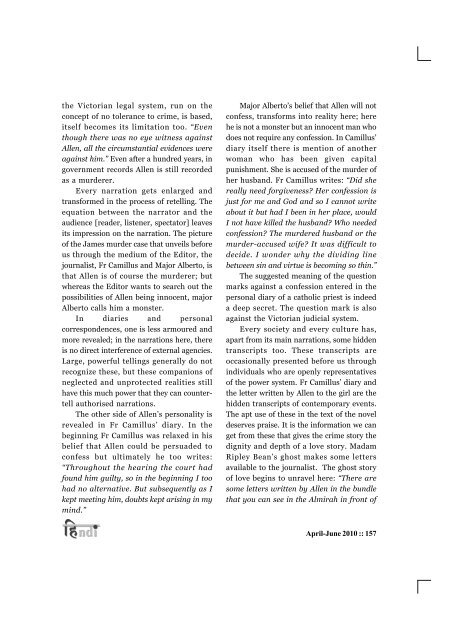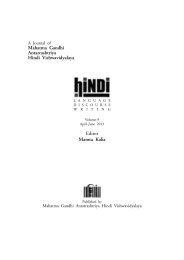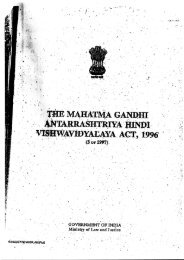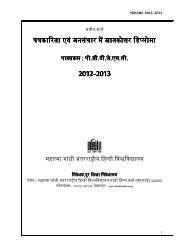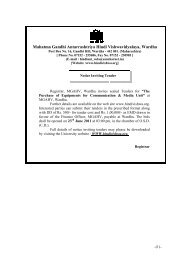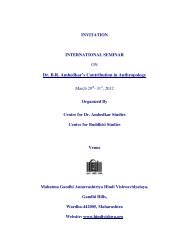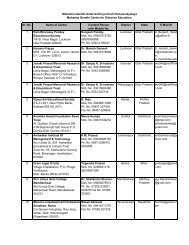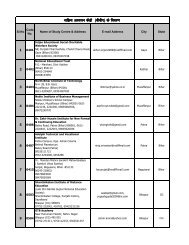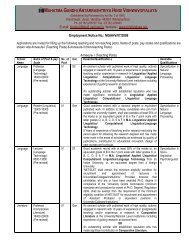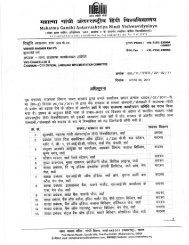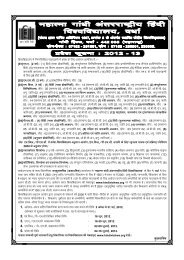Mamta Kalia
Mamta Kalia
Mamta Kalia
You also want an ePaper? Increase the reach of your titles
YUMPU automatically turns print PDFs into web optimized ePapers that Google loves.
the Victorian legal system, run on the<br />
concept of no tolerance to crime, is based,<br />
itself becomes its limitation too. “Even<br />
though there was no eye witness against<br />
Allen, all the circumstantial evidences were<br />
against him.” Even after a hundred years, in<br />
government records Allen is still recorded<br />
as a murderer.<br />
Every narration gets enlarged and<br />
transformed in the process of retelling. The<br />
equation between the narrator and the<br />
audience [reader, listener, spectator] leaves<br />
its impression on the narration. The picture<br />
of the James murder case that unveils before<br />
us through the medium of the Editor, the<br />
journalist, Fr Camillus and Major Alberto, is<br />
that Allen is of course the murderer; but<br />
whereas the Editor wants to search out the<br />
possibilities of Allen being innocent, major<br />
Alberto calls him a monster.<br />
In diaries and personal<br />
correspondences, one is less armoured and<br />
more revealed; in the narrations here, there<br />
is no direct interference of external agencies.<br />
Large, powerful tellings generally do not<br />
recognize these, but these companions of<br />
neglected and unprotected realities still<br />
have this much power that they can countertell<br />
authorised narrations.<br />
The other side of Allen’s personality is<br />
revealed in Fr Camillus’ diary. In the<br />
beginning Fr Camillus was relaxed in his<br />
belief that Allen could be persuaded to<br />
confess but ultimately he too writes:<br />
“Throughout the hearing the court had<br />
found him guilty, so in the beginning I too<br />
had no alternative. But subsequently as I<br />
kept meeting him, doubts kept arising in my<br />
mind.”<br />
Major Alberto’s belief that Allen will not<br />
confess, transforms into reality here; here<br />
he is not a monster but an innocent man who<br />
does not require any confession. In Camillus’<br />
diary itself there is mention of another<br />
woman who has been given capital<br />
punishment. She is accused of the murder of<br />
her husband. Fr Camillus writes: “Did she<br />
really need forgiveness? Her confession is<br />
just for me and God and so I cannot write<br />
about it but had I been in her place, would<br />
I not have killed the husband? Who needed<br />
confession? The murdered husband or the<br />
murder-accused wife? It was difficult to<br />
decide. I wonder why the dividing line<br />
between sin and virtue is becoming so thin.”<br />
The suggested meaning of the question<br />
marks against a confession entered in the<br />
personal diary of a catholic priest is indeed<br />
a deep secret. The question mark is also<br />
against the Victorian judicial system.<br />
Every society and every culture has,<br />
apart from its main narrations, some hidden<br />
transcripts too. These transcripts are<br />
occasionally presented before us through<br />
individuals who are openly representatives<br />
of the power system. Fr Camillus’ diary and<br />
the letter written by Allen to the girl are the<br />
hidden transcripts of contemporary events.<br />
The apt use of these in the text of the novel<br />
deserves praise. It is the information we can<br />
get from these that gives the crime story the<br />
dignity and depth of a love story. Madam<br />
Ripley Bean’s ghost makes some letters<br />
available to the journalist. The ghost story<br />
of love begins to unravel here: “There are<br />
some letters written by Allen in the bundle<br />
that you can see in the Almirah in front of<br />
April-June 2010 :: 157


